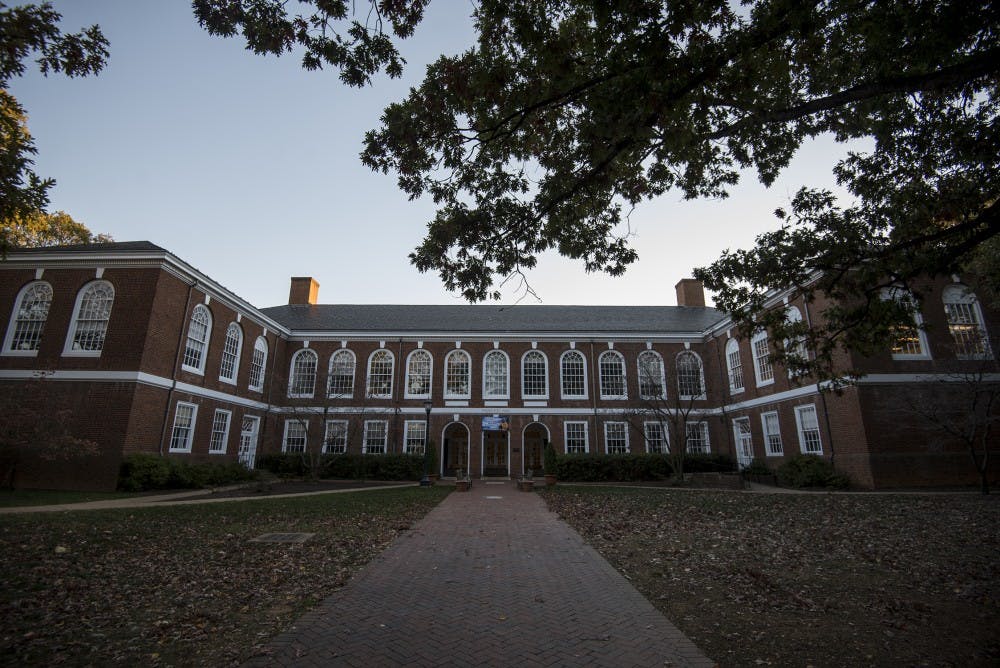First-year mechanical engineering students learned right after spring break they will no longer be able to participate in the Technology Leaders Program.
TLP began as an interdisciplinary program between the Systems, Computer and Electrical Engineering departments in 2008, with the Mechanical Engineering department joining in 2012. TLP students take interdisciplinary classes, bringing their individual technical skills to the TLP classes to earn a design integration minor.
Engineering students joined TLP by expressing interest on their major declaration forms in March of their first year. This year, 36 out of 75 mechanical engineering students expressed interest. However, first-year Engineering students received an email informing of them of the Mechanical Engineering department’s decision to leave the program after spring break.
Engineering Prof. Eric Loth, who also chairs the Department of Mechanical and Aerospace Engineering, said in an email to The Cavalier Daily that the department will continue to support their students currently in the program, but current first-year students will not be able to participate.
“The Technology Leaders Program offers a good, cross-disciplinary minor to engineering students, including some students from Mechanical Engineering,” Loth said. “However, our department is constantly looking for new opportunities to provide the best possible education and experience to its students, and the MAE faculty decided to focus their energy and resources on activities that will have a broader impact on all of our undergraduates."
Reid Bailey, founder and co-director of TLP and an associate professor in the Department of Systems and Information Engineering, said he first learned the department was considering leaving the program in late January.
“Several of us … met with them to talk about it in hopes of convincing them otherwise,” Bailey said. “After that meeting there was some sense that a decision would be made later, and it was, over spring break.”
James Stapleton, a third-year Mechanical Engineering and TLP student, said TLP students first learned about the Mechanical Engineering department’s decision after it was made official in March.
“It had apparently been an ongoing conversation between the administration, between the Mechanical Engineering chair, different faculty members and our professors, but we were kept out of the line of communication until the decision was actually made,” Stapleton said.
Since then, TLP students have organized meetings with members of the administration and faculty to express their concerns. Rachel Dunning, a fourth-year Mechanical Engineering student, went to the first meeting last week, which was initiated by undergraduates.
“The ultimate goal is to keep mechanical engineers in the TLP, because it’s one of the four core majors that originally make it all work together and, without it, the TLP loses some of its strength,” Dunning said. “I think all mechanical engineers should have this opportunity to go for it if they want it. Not all of them want to, but those who want to, they shouldn’t be hindered by having the mechanical engineering department pull out.”
Jasbir Harnal, a fourth-year Mechanical Engineering student, said he has talked about his experience in TLP in every interview.
“Mechanical engineering is one of the most popular majors, so we’re a dime a dozen. TLP makes us much more unique,” Harnal said. “Both internships I’ve had, I’ve worked with people from different backgrounds, and working on team projects in the TLP is super important for that.”
Rosalie Reuss, a third-year Systems Engineering student, called TLP a “keystone” in her engineering education. She declared a major in Mechanical Engineering, but then changed majors after TLP helped her realize she was more interested in Systems.
As a systems engineer, Reuss said she believes TLP will be negatively impacted by the Mechanical Engineering department’s withdrawal.
“I think the whole point of the TLP is that it’s interdisciplinary,” Reuss said. “When you’re taking out one of the key disciplines … removing one of those aspects is really detrimental not only to other students, but also the mechanical students.”
Because the program does not belong to any department in the Engineering School, each department must pay for their students to become involved in the program. Dunning said at one of the meetings organized by undergraduates, representatives from the Mechanical Engineering department said it is withdrawing from the program in order to use those financial resources to incorporate aspects of TLP into the department.
While students said they believe the department could develop a program with the hands-on aspect of TLP, they also said it would be impossible for a new program to offer the interdisciplinary aspect offered by TLP.
“I think that the TLP is most valuable for mechanical engineers because it’s so far removed from our department,” Harnal said. “It doesn’t make sense to have an interdisciplinary program within one department.”
Stapleton said he was concerned a new program would not be as organized as TLP.
“For my year, the second-, third- and fourth- year classes, we’ll be able to finish the TLP, no problem, get our minor, but this first-year class, it really seems like they’re getting the short end of the stick,” Stapleton said. “Instead of having a small group of them be able to experience this great program, none of them are going to be able to experience this great program.”
Stapleton also said he hopes there will more communication between undergraduate students and the administration when developing the new program, considering the students did not play a role in the department’s decision to withdraw.
“I just want to establish those lines of communication, and then also understand the reasons why Mechanical Engineering is pulling out of the TLP, and also what kinds of long-term plans the Mechanical Engineering department has to fix the issue of not having any sort of interdisciplinary aspect of their degree,” Stapleton said.
To account for the Mechanical Engineering department leaving, Bailey said TLP is considering considering changing the application timeline to allow students to apply in the fall of their second year. He said he believes there would be more interest after students learn more about TLP.
“Without Mechanical here, we have a big hole in the program, and it wasn’t filled up by other applicants, so we’re going to have a small class because of that,” Bailey said. “The only changes that might happen … would be to provide more pathways for students to become involved in the TLP, maybe later. My sense is that we’d get a lot more interest out of it.”
While Bailey said he is unsure if a Mechanical Engineering program would be able to be truly interdisciplinary, he is willing to work with the department to develop their own program.
“It would be a great day if the TLP ended because it was taught in every department,” Bailey said. “But it doesn’t seem like all of it can be taught within the department.”





